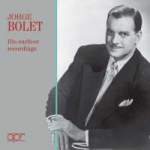Despite early critical acclaim, Jorge Bolet’s career never really took off until the early 1970s, when he was approaching his sixth decade. Yet the pianist’s 1952/53 recordings for the Boston and Remington labels (his first commercial discs) already attest to his polished, aristocratic virtuosity. Not even the constricted sonics obscure Bolet’s wide palette of colors and his elegantly differentiated articulation.
The Spanish selections are especially refined in this sense, yet retain plenty of rhythmic backbone (Albéniz’s Malagueña is a ravishing example). The Mendelssohn pieces could be lighter and suppler, yet Bolet’s rounded phrasing and subtle dynamic gradations compensate. For true scintillation and characterful nuance, however, Moszkowski’s En Automne and the deliciously teased Saint-Saëns Valse etude represent Bolet at his apex.
The world-premiere recording of Prokofiev’s Second Concerto displays Bolet’s youthful power and dynamism, as well as his cogent melodic projection. Unfortunately the limited sound quality obscures much of the music’s delightful scoring (the rapid woodwind flourishes and massive brass chords barely register); I hope that Bolet’s less incisive but equally poetic remake with Ainslee Cox and the Nuremberg Symphony (coupled with the Prokofiev Third Concerto) on the Genesis label will come back into print.
While the four Chopin Scherzos are on the dry side and do not match Bolet’s live versions (released on Marston) for sweep and excitement, you still can appreciate the pianist’s clean and classically poised fingerwork in Nos. 3 and 4, his ear-catching inner voices in No. 1’s outer sections, and his care with No. 2’s opening triplet figure and its numerous reiterations. Farhan Malik’s informative annotations and Seth Winner’s noise-free restorations add further value to a welcome reissue that is bound to please collectors with a special interest in Bolet.
































